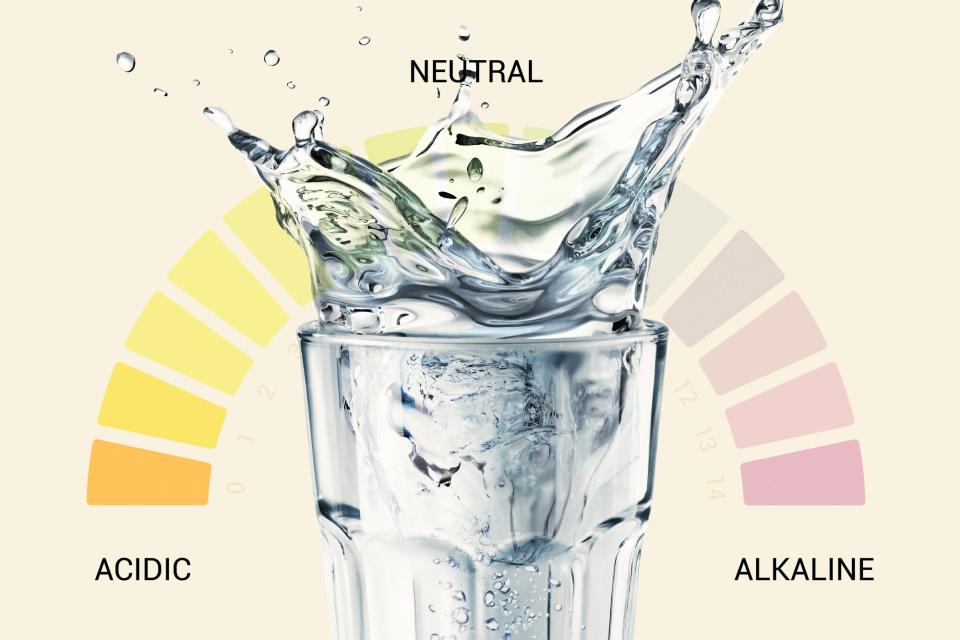What Is Alkaline Water—and Is It Healthy?
Staying hydrated can provide many benefits. Glowing skin, higher energy levels and heart health are just a few. Many products try to capitalize on the potential of proper hydration—and alkaline water is one of them. According to the World Wide Web, alkaline water vows to improve hydration, reduce acid in the bloodstream, aid healthy digestion, slow aging and reduce bone loss. Sounds like miracle water, right? We consulted two dietitians for their take on if these claims are fact, fiction or a mix of both.
What Is Alkaline Water?
"Alkaline water is made from hydrogen and oxygen—just like all waters. But it has a higher pH than other waters," says Lauren Manaker, M.S., RD, LD, CLEC. "It may also contain added minerals or ingredients, like baking soda, to make the pH higher."
The abbreviation "pH" stands for potential hydrogen, which refers to how acidic or basic a substance is. Buckle up for a quick chemistry lesson: The pH scale ranges from 0 to 14—zero being acidic and 14 being alkaline. For reference, a lemon is usually a 2 (acidic) while baking soda sits around an 8 or 9 (alkaline). The Environmental Protection Agency says drinking water can be 6.5 to 8 on the pH scale, but most tap water falls at a 7 (neutral) or below. Any water above a 7 is considered alkaline.

Adobe Stock / kolonko / matis75
How Is Alkaline Water Made?
There are two types of alkaline water—natural and artificial. "Some waters can be more alkaline if they are naturally occurring in an area that has rocks that are rich in certain minerals," Manaker says. Some brands of natural alkaline water may include calcium, potassium, magnesium and bicarbonate. These added minerals are meant to enrich alkalinity and taste.
Water may also be put through a process called electrolysis to raise the pH. The alkaline waters perched on store shelves, like brands Smartwater and Essentia, have usually been put through an ionizer—an appliance used to separate out more-acidic molecules.
There are also a variety of at-home methods to produce the same effect, such as an at-home ionizer, water filter, pH drops or even pantry ingredients, like baking soda.
What Are the Benefits of Alkaline Water?
Some studies show acidity encourages tumor growth, which raises the question: Could the high pH (or basic) potential of alkaline water help prevent cancer? Unfortunately, there's no medical evidence to support the idea that drinking alkaline water negates cancer growth.
Results from a clinical trial, published in Medical Gas Research, found that regular ingestion of alkaline water helped ease gastrointestinal symptoms (like stomachaches, heartburn, heavy stomach, lower abdominal pain, bloated stomach, etc.). While these results could be promising, alkaline water may also have an adverse effect for some people. (More on that in the risks section below.)
Other research correlates alkaline water with slower aging and bone deterioration, but the Food and Drug Administration has denied claims citing a link between alkaline water and osteoporosis, due to lack of significant scientific evidence.
Many of these claimed benefits are results of studies that correlate animal reactions (think mice) to human health or are conducted on a small scale. "While many claims sound promising, unfortunately, strong clinical data backing them is lacking," Manaker says.
Are Any Risks Associated with Alkaline Water?
Although blood pH levels should remain around 7, that doesn't ring true for the stomach. Gastric pH should remain much lower, around a 2 or 3, as stomach acid is crucial to proper digestive function and is needed to ward off bad bacteria. Agitating these levels could cause nausea, or skin irritations but nothing too menacing. "Assuming a person has properly functioning kidneys, alkaline water appears to be safe to consume," Manaker says. "A person may feel some GI discomfort or skin irritations when overconsumption occurs, but, generally speaking, it appears to be safe."
However, alkaline water is probably best to skip if you have kidney disease—the excess minerals could lead to unhealthy accumulation in the body.
Related: 4 Foods That Can Help Protect Your Kidneys
Should You Be Drinking Alkaline Water?
"Our blood pH is very tightly regulated, so when we're looking at our diet and different claims of eating certain foods or drinking alkaline waters to neutralize your pH, there is really no food that is going to do that," says Rebecca Harken, M.S, RD, LD, CPT. "Your body is going to do it for you!" If the body senses excess acid, our lungs and kidneys immediately kick into gear and do what they do best—regulate. The process involves expelling carbon dioxide through breath and urine or secreting bicarbonate (a byproduct of metabolism that buffers acid).
Some claims say alkaline water is a good workout recovery drink due to its hydrating nature—though Harken recommends opting for regular water or a sport drink instead—but any way you're getting fluids is a win. "A lot of my clients have a hard time getting enough water anyway, so anything that is going to help you get in that fluid is a good bet," Harken says.
Related: Electrolyte Drinks: What Are They and Do You Need Them?
The Bottom Line
Although no significant risks seem to be associated with alkaline water, there aren't many research-backed benefits, either. When it comes to staying hydrated, plain ol' water might be your best bet. Water labeled "alkaline" doesn't override your body's natural ability to regulate pH. "Whether alkaline water is the health solution we all need is yet to be determined," Manaker says. "There don't appear to be any major negative health outcomes that come from drinking alkaline water, but choosing this water can become costly—it may cause damage to a person's wallet unnecessarily!"

